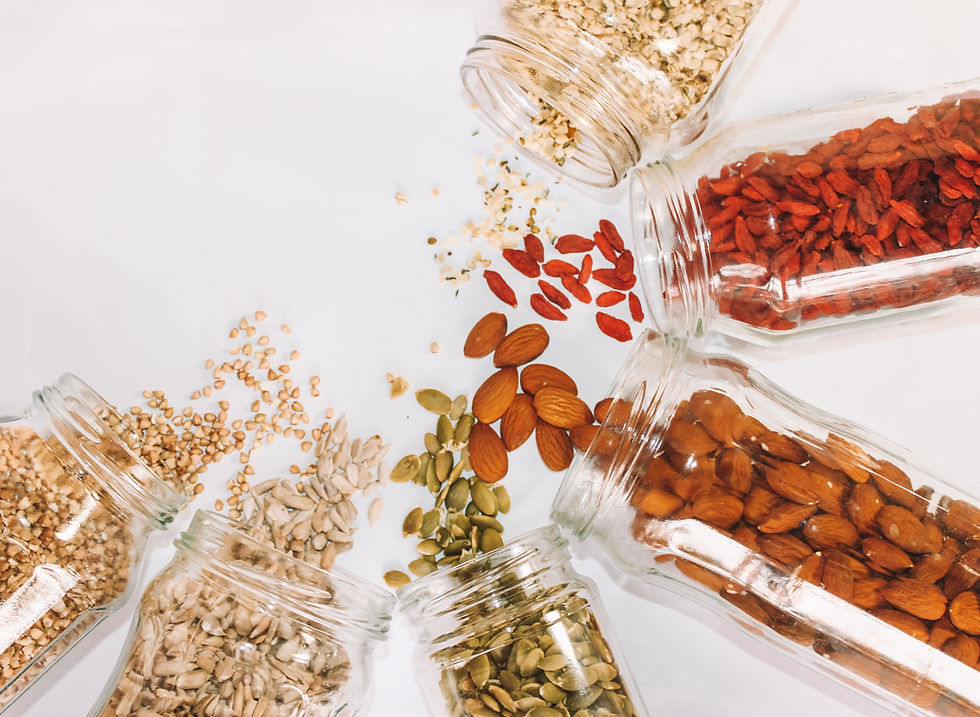THE POWER OF SEED CYCLING FOR FERTILITY
- Francesca Mastrojanni

- Nov 8, 2023
- 3 min read
Fertility is a topic that has been of great importance to humans for centuries. Many factors can influence one's ability to conceive, including lifestyle, diet, and hormonal balance. In recent years, there has been growing interest in holistic approaches to fertility, and one such approach is seed cycling.
Seed cycling involves incorporating specific seeds into your diet during different phases of your menstrual cycle to support hormonal balance and potentially boost fertility. In this blog, we will explore the power of seed cycling for fertility and how it may help you on your journey to parenthood. Understanding the Menstrual Cycle

Before diving into the details of seed cycling, it's essential to understand the menstrual cycle and its relationship with fertility. The menstrual cycle is divided into two main phases: the follicular phase and the luteal phase. Each phase is characterized by fluctuations in hormone levels, primarily estrogen and progesterone.
Follicular Phase: This phase occurs during the first two weeks of your menstrual cycle, starting on the first day of your period. Estrogen levels rise during this phase, preparing the body for potential pregnancy.
Luteal Phase: Following ovulation, the luteal phase begins. This phase typically lasts about two weeks, and it is marked by increased progesterone levels. Progesterone is essential for maintaining a pregnancy.
Seed Cycling and Hormonal Balance
Seed cycling is a natural and holistic approach to supporting hormonal balance by harnessing the power of specific seeds. This practice involves consuming different seeds during each phase of your menstrual cycle to encourage the production and balance of key hormones.
Follicular Phase Seeds: During the follicular phase, when estrogen levels are rising, it is recommended to incorporate flax seeds and pumpkin seeds into your diet. Flax seeds contain lignans, which can help modulate estrogen levels, while pumpkin seeds provide essential nutrients like zinc and magnesium.
Luteal Phase Seeds: In the luteal phase, when progesterone takes the center stage, sesame seeds and sunflower seeds are recommended. These seeds offer nutrients like vitamin E and essential fatty acids that can support progesterone production.
How Seed Cycling Supports Fertility
Now, let's explore how seed cycling can positively impact fertility:
Hormone Regulation: Seed cycling can help regulate hormonal fluctuations, ensuring that estrogen and progesterone levels are balanced. This balance is crucial for the overall health of the menstrual cycle and fertility.
Nutrient Support: The seeds recommended for each phase of the menstrual cycle provide essential nutrients that play a role in reproductive health. Zinc, magnesium, vitamin E, and fatty acids are all important for a healthy reproductive system.
Reduced Inflammation: Many seeds used in seed cycling are rich in antioxidants and anti-inflammatory compounds. Reducing inflammation in the body can have a positive impact on fertility by creating a more hospitable environment for implantation and early pregnancy.
Improved Egg Quality: The hormonal balance and nutrient support offered by seed cycling may contribute to better egg quality, which is a crucial factor in fertility and successful conception.
Incorporating Seed Cycling into Your Routine
To harness the power of seed cycling for fertility, you can start by adding the recommended seeds to your daily diet during the corresponding menstrual phases. Here's a simple guide to get you started:
Follicular Phase (Days 1-14): Include flax seeds and pumpkin seeds in smoothies, oatmeal, yogurt, or salads.
Luteal Phase (Days 15-28): Integrate sesame seeds and sunflower seeds into your meals. They can be sprinkled on top of dishes or included in homemade energy bars.
It's essential to pay attention to your body and adjust the quantity of seeds to suit your needs. While some people experience noticeable improvements relatively quickly, it may take a few menstrual cycles for others to see the full benefits of seed cycling. Conclusion
In the journey towards achieving fertility, it's essential to explore various holistic approaches that can complement traditional medical treatments and lifestyle adjustments. Seed cycling is one such approach that harnesses the power of specific seeds to support hormonal balance, reduce inflammation, and potentially improve fertility. While it may not be a miracle solution for everyone, it's a natural and nutritious way to enhance your reproductive health and overall well-being. Remember that consulting with a healthcare provider or a fertility specialist is always a good idea if you have concerns about your fertility or want personalised guidance on seed cycling.




Comments